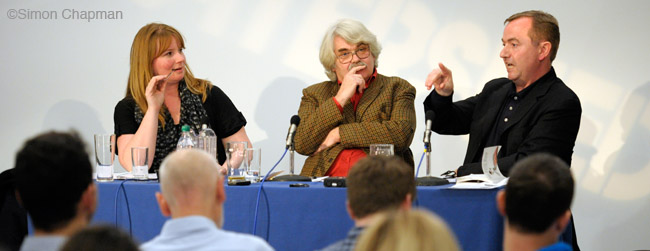
Bristol NUJ debate hears from union leader and libertarian free-speecher on eve of Leveson report
NUJ general secretary Michelle Stanistreet and former Living Marxism editor Mick Hume both say they want a free press – but they have different views on what it entails.
The pair were debating in front of a lively Bristol audience in the union’s annual Benn Debate on the eve of the publication of the Leveson report.
A straw poll at the start of the debate conducted by the event’s chair, Mike Jempson, found that the audience largely favoured legal regulation for the press, a view which won 38 votes against 13 who preferred absolute freedom to publish.
Mick Hume, author of There’s No Such Thing as A Free Press, mounted a spirited defence of media liberty American-style, pointing out that the US constitution forbids any law which restricts press freedom.
Phone hacking is indefensible, he said – but it is already illegal, and it has led to the biggest criminal investigation in British history, as well as an attack on essential principles of liberty.
“In the name of ethics it has become a semi-religious crusade, an exercise in ethical cleansing”, he said, which aims “to cleanse the press of those things which are not to the taste of its opponents.”
“I defend the right of the press to be an almighty mess,” he told the audience at Bristol’s Watershed, which included 50 students of journalism from the University of the West of England.
“Freedom is a messy business.”
Michelle Stanistreet said it was essential that the press should remain free – but also that it should be held to account when it got things wrong.
That is why the NUJ has long had a Code of Conduct so that journalists can refuse to do work which is unethical.
“Sadly many of our newsrooms are owned by people who are very hostile to unions and in particular the NUJ,” she said.
“It’s no surprise that some of the worst abuses happened in a company [News International] where the NUJ has been barred for more than a decade.”
The Press Complaints Commission, she said, has “more in common with a gentlemen’s club than a regulator.”
Condemning as useless the PCC’s proposals to continue self-regulation, she said: “They have been drinking in the last chance saloon for decades.”
A regulator needs to be underpinned by law, but independent of the industry and of the Government, Stanistreet said.
It needs to ensure that people wronged by the press have the right to complain – not just those who are named in a story, but people like asylum seekers attacked on the back of prejudiced stories.
She suggested the model of the Irish Press Ombudsman, which the NUJ helped set up.
In a question session, some in the audience suggested they trust first-hand accounts by bloggers more than they trust the established media.
Susie Weldon, a former executive member of Bristol NUJ, asked Hume how he would protect victims of the press who wanted to put the record straight.
One woman spoke up on behalf of her son, a deputy editor of a weekly newspaper, who she said was not earning a living wage but faced a huge workload.
A student of journalism said she expected to face problems such as newsroom bullying – but she wanted to be a journalist, so she would have to deal with it.
In response, Stanistreet said no one expects to be bullied in their workplace. Many workplace problems trace back to owners, who once enjoyed “years and years of profits  of 30 per cent” and are now suffering in the recession.
Hume said some moves could be made to help victims of the press, such as speedier and more prominent corrections.
He attacked those on the left who think the perceived right-wing dominance of the media is all the fault of Rupert Murdoch.
The big problem is a failure to make a popular alternative media, he said – but that is not Murdoch’s fault.
Chair Mike Jempson asked Stanistreet about claims the NUJ was split, with members upset and even resigning about the union’s backing for statutory regulation.
Not true, said Stanistreet. Only six or seven members had resigned.
“A lot of unhappy people contacted the union after reading the Sun and the Telegraph saying we were advocating state control of the press.”
That is not what the NUJ wants she said, even though the Sun accused her of wanting  a system like Zimbabwe’s or Iran’s.
“It’s about having some accountability for members of the public. It’s not about an assault on the freedom of the press.”
Hume attacked ideas of subsidies to support the press, calling it “an absolute nightmare. I cannot think of any greater danger  to a diverse press.”
He ended by pointing to the words of Karl Marx in the 1840s who told Prussian censors of the press: “You cannot pluck the rose without its thorns! And what do you lose with a free press?”
Hume’s arguments had clearly won over some of the audience; a final vote was still in favour of legal backing for a press regulator, but by the smaller margin of 35 to 21.
• Another view by Liam Corcoran, member of @wannabehacks, online editor for UWE’s @westerneye: http://wanab.be/TkFe8D
The event was supported by the University of the West of England and Bristol Festival of Ideas.